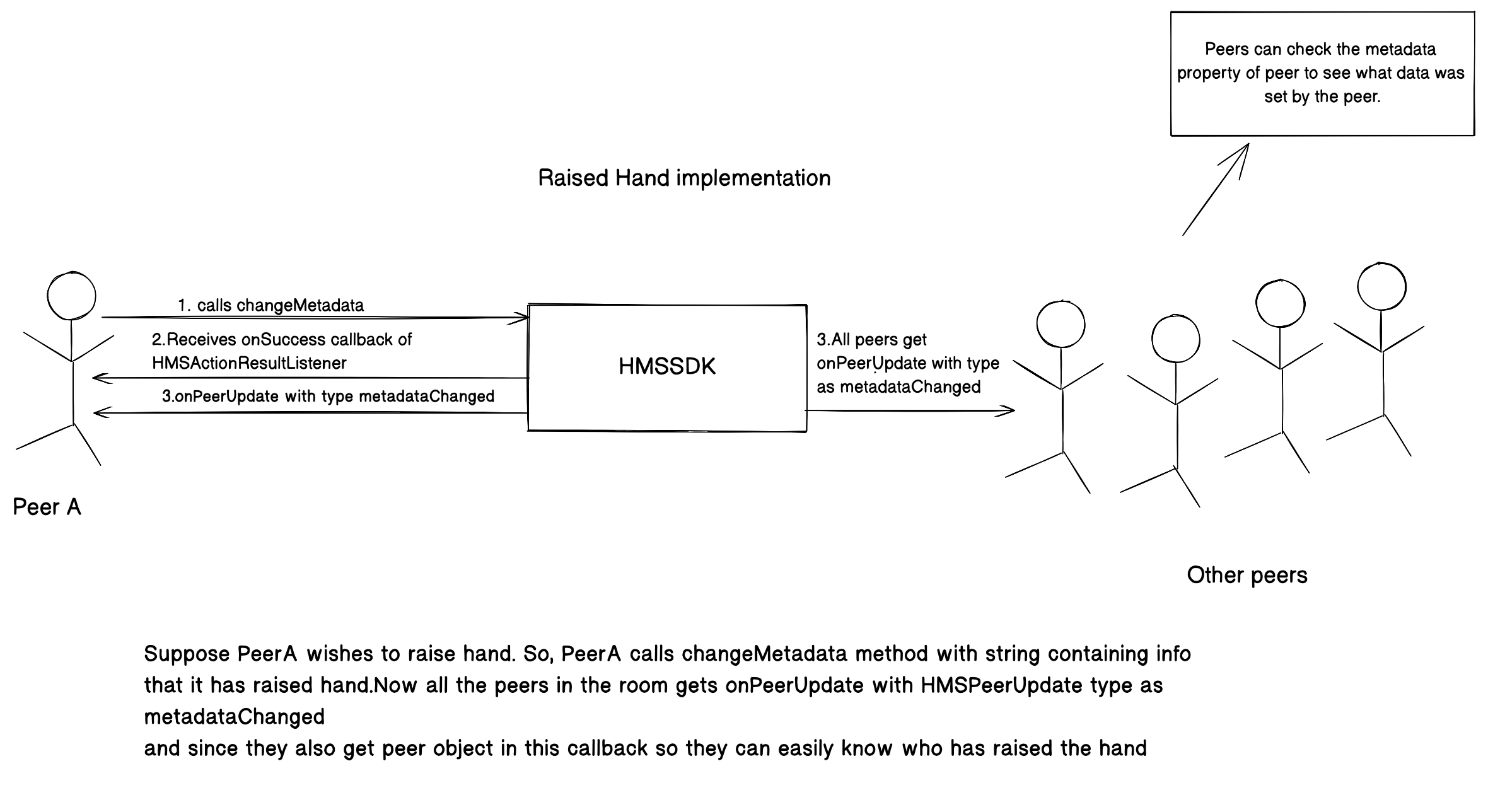Persistent Participant States (Peer Metadata)
Looking for a persistent state that can be set on a peer and updated anytime, for everyone in the room? Peer metadata it is.
Metadata can be set initially in the HMSConfig object that's passed into the join method. This can be used to display profile pictures as the user's avatar in meetings. You can imagine metadata as a persistent object attached to the peer which has more details about them.
Peer Metadata can be changed after joining the Room as well.
To set metadata before joining the room, pass the metadata property to HMSConfig used to Join the Room.
const config = new HMSConfig({ authToken: 'eyJH5c...', username: 'John Appleseed', metadata: '{"avatar": "location/on/amazon/storage"}' });
This section will show you how to:
- Get Peer Metadata.
- How to respond when a remote peer changes its metadata.
- How to set a peer's metadata.
Get Peer Metadata
Peer Metadata is available on HMSPeer object of that peer. You can read the metadata property on any HMSPeer instance to get metadata of that peer.
// Getting Local Peer object const localPeer = await hmsInstance.getLocalPeer(); // Getting "metadata" of local peer const localPeerMetaData = localPeer.metadata;
How to listen to updates when metadata of any peer is updated
Whenever a peers' metadata is updated, HMSUpdateListenerActions.ON_PEER_UPDATE event is emitted with HMSPeerUpdate.METADATA_CHANGED update type. You can subscribe to this event and update the UI for updated peer.
const onPeerListener = (data: { peer: HMSPeer, type: HMSPeerUpdate }) => { const { peer, type } = data; if (type === HMSPeerUpdate.METADATA_CHANGED) { // Metadata for the {peer} is changed // Update UI for the {peer} // Parsing the updated Metadata const metadata = JSON.parse(peer.metadata); } }; hmsInstance.addEventListener(HMSUpdateListenerActions.ON_PEER_UPDATE, onPeerListener);
Set Peer Metadata
You can use changeMetadata method available on HMSSDK instance to change the metadata of yourself (Local Peer).
try { const metadata = { zodiacSign: 'virgo' }; const metadataString = JSON.stringify(metadata); hmsInstance.changeMetadata(metadataString); console.log('Change Metadata Success'); } catch (error) { console.log('Change Metadata Error: ', error); }
Use cases
Hand Raise
This is a very common requirement where the people attending a webinar or online class wish to ask a question. They can let the speaker know by raising their hands in the application similar to what they would have done in an offline event.
Let's understand this with a diagram:

Let's check the implementation step-by-step:
PeerA changes Metadata
Peer A calls changeMetadata with metadata as -
try { const metadata = { isHandRaised: true }; const metadataString = JSON.stringify(metadata); hmsInstance.changeMetadata(metadataString); console.log('Change Metadata Success'); } catch (error) { console.log('Change Metadata Error: ', error); }
All the peers receives Metadata update
As soon as changeMetadata method call in above step is successful, All the peers in the room will get HMSUpdateListenerActions.ON_PEER_UPDATE event with HMSPeerUpdate.METADATA_CHANGED update type.
Let's see how we can update the UI using this:
const onPeerListener = (data: { peer: HMSPeer, type: HMSPeerUpdate }) => { const { peer, type } = data; if (type === HMSPeerUpdate.METADATA_CHANGED) { // We can get the metadata from `HMSPeer` object // Parsing the updated Metadata const metadata = JSON.parse(peer.metadata); // Metadata for the {peer} is changed, Update Hand Raised UI for the {peer} console.log(metadata.isHandRaised); } }; hmsInstance.addEventListener(HMSUpdateListenerActions.ON_PEER_UPDATE, onPeerListener);
Polls
We can use peers' metadata property to implement polls similar to what we did in above implementation.
There are many more use cases which can be implemented using peer metadata. Have any questions regarding the use cases please reach out to us support@100ms.live



